News
ArcelorMittal and John Cockerill to develop industrial-scale, low-temperature iron electrolysis plant
ArcelorMittal and John Cockerill announced plans to construct an industrial-scale low temperature, iron electrolysis plant. The Volteron plant—which in a first phase will produce between 40,000 tpy and 80,000 tpy of iron plates—is targeted to start production in 2027. Once the technology has been proven at this scale, the intention is to increase the plant’s capacity to between 300,000 tpy and 1 MMtpy.
ArcelorMittal and John Cockerill have been working together on an innovative electrochemical process to transform iron oxide into iron plates for the last few years. The successfully completed project, formerly known as SIDERWIN, has to date been publicly funded through the EU’s Horizon 2020 program. In addition to ArcelorMittal and John Cockerill, project partners have included EDF, Tecnalia, Quantis, University of Aveiro, National Technical University of Athens, Norwegian University of Science and Technology, Dynergie, Recoy, CFD Numerics and Mytilineos. This next phase of the project will be carried forward as an exclusive partnership between ArcelorMittal and John Cockerill.
Volteron is a carbon free, cold direct electrolysis process that extracts iron from iron ore using electricity. On a pilot scale plant, the process has proved to be highly efficient using standard iron ore. The iron plates created during the electrolysis process are then processed into steel in an electric arc furnace.
Brad Davey, EVP and head of corporate business optimization, ArcelorMittal said, “This is a tremendously exciting development and opportunity for our company. We have been working on direct electrolysis technology for some time given the potential it holds to decarbonize steelmaking. Having now proven our energy efficient, low temperature process at a pilot level, the natural next step for us is to progress to an industrial plant. We intend to achieve this target within four years and be the first in the world to produce steel at scale via low temperature electrolysis.
“It is a significant moment for ArcelorMittal, and for the global steel industry. Direct electrolysis is a disruptive, breakthrough technology. Although the technology needs to mature, it could revolutionize how steel is made, removing carbon entirely from steelmaking. We intend to be pioneers in that process.”
Sébastien Roussel, President of John Cockerill Industry said, “As a bicentennial technology leader in steelmaking engineering and current world leader for electrolysis dedicated to H2 production, we are extremely proud to develop together with ArcelorMittal a technology that can be a significant contribution to tackling global warming. We are convinced that Volteron is the most energy efficient process to produce steel without emitting CO2 and that it will soon become a real game changer for the steelmaking industry.”
Direct electrolysis is one of three decarbonization technology pathways ArcelorMittal is working on to make net zero steelmaking a reality. The other two are Smart Carbon and Innovative-DRI. The Smart Carbon pathway involves modifying the blast furnace steelmaking route and harnessing clean energy sources including bioenergy and carbon capture and storage, while the Innovative-DRI route involves using H2 as a replacement for fossil fuels to make direct reduced iron, a metallic feedstock for steelmaking in an electric arc furnace.


